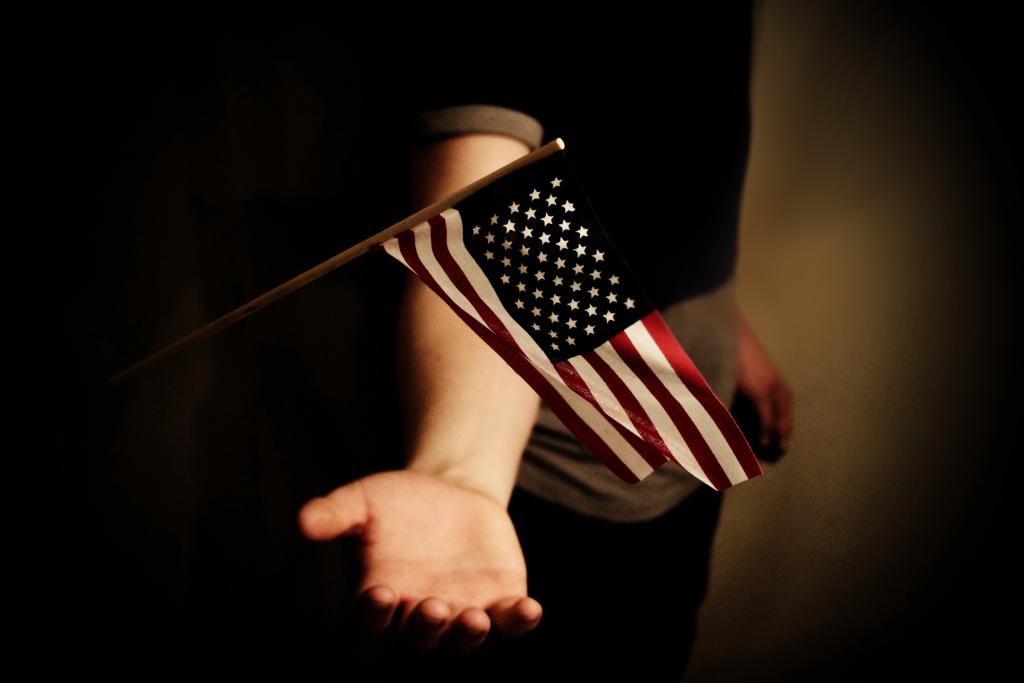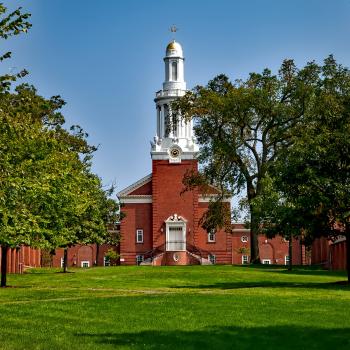
“When Roy Moore voices his opposition to the Supreme Court’s decision to recognize Gay Marriage, he is unaware of the irony that his very same logic was used by Christians to defend the institution of slavery and helped to allow for the 1857 decision that he objects to.”
Roy Moore is in the news again and once more (no pun intended), very few are happy about it on either side of the political divide. Moore, the surprise Republican nominee for the Alabama election to the U.S. Senate, had audio from an interview last year surface.
As background: Moore is a former Alabama Supreme Court Chief Justice who was removed from office because he refused to obey the law and directed judges in Alabama to disobey the U.S. Supreme Court’s ruling which legalized gay marriage.
Speaking on a podcast last year, Moore voiced his opinion that the Supreme Court’s decision to legalize Gay Marriage was worse than its decision in 1857 to declare black people property. That decision precipitated the Civil War, a point that Moore ominously alludes to.
“In 1857 the United States Supreme Court did rule that black people were property. Of course that contradicted the Constitution, and it took a civil war to overturn it. But this ruling in Obergefell is even worse in a sense because it forces not only people to recognize marriage other than the institution ordained of God and recognized by nearly every state in the union, it says that you now must do away with the definition of marriage and make it between two persons of the same gender or leading on, as one of the dissenting justices said, to polygamy, to multi-partner marriages.“
Moore’s comments have sickened most who have heard them. What normal person, even a conservative opponent to Gay Marriage, would feel comfortable likening a government recognition of two people’s monogamous choice with the dehumanization and enslavement of an entire race of people by a government?
However, as much as I too have been hurt to hear such a warped sense of morality, Moore actually does have a point. And surprisingly, in 1857, the year he cites, most Christians in the Southern states of America would have perfectly understood it.
So let’s be clear, no matter how much I hate to admit it: Roy Moore is right.
The truth is that, from the perspective of Biblical Israel, Homosexual relations were indeed worse than slavery. For the Bible writers, one was a sin and the latter was a legal institution sanctioned by God himself.
In other words: if Moses were listening to Moore, the Bible says that he likely would have nodded in agreement. However, as Christians and followers of Jesus, and with all due respect to Moses, we cannot. As Americans, we simply cannot.
WAIT… THE BIBLE ENDORSES SLAVERY?
The Biblical stories feature slavery time and time again in many of their narratives. It was a reality for them that needed no explanation. However, what some have conveniently forgotten in our modern church is that the Bible doesn’t merely refer to the existing reality of slavery, it readily supported it.
I realize that this might come as a bit of a shock. Many Christians remain unaware of this fact.
God didn’t just wink at the idea of slavery, he is said to actually have endorsed it, such as in Deuteronomy 20 and Leviticus 25, commanding that his people should take others INTO slavery (10-15; 44). And Joshua 9 and Leviticus 25 state that foreign slaves will remain the slaves (property) of their respective Israelite owners forever, their children becoming slaves perpetually for the benefit of their Master’s family heritage (23-27; 44-46).
Exodus 21:7 states that God allows fathers to forcibly sell their young daughters to be slaves and Exodus 21:20 states that if a slave master beats his slave to death, he should have some sort of punishment, but if the slave survives and can walk after a day or two (even though he nearly died), the slave master should not be punished, because, as the Bible clearly states, “the slave is the owner’s property.”
Unfortunately for us, the tired Christian cop-out that this is all in the OLD Testament and unimportant won’t save us. Jesus may have announced in the synagogue that he had come to set free the captives, but Paul, Peter and some others didn’t apparently get the memo (Col. 3:22; Titus 2:9; 1 Peter 2:18-25).
The letter of 1 Timothy, famous for it’s instructions on women not speaking, is even more infamous for endorsing that Christians may own slaves and that slaves of Christian slave-masters should be even more fearful and devout to them than a worldly master (6:1-2).
MOORE’S LOGIC AND 19TH CENTURY CHRISTIAN THINKING
While Roy Moore may sound crazy today to most American Christians (even those who oppose Gay Marriage), his thoughts are actually echoes of an earlier time in American Christianity when such things were not only sane, but staunchly orthodox.
As any modern conservative Christian will tell you today: the Bible says it and that settles it.
This is such a widely held belief that you will find countless bumper stickers that say it. This is the logic conservative Christians usually have when it comes to the issue of homosexuality and certainly underlies Moore’s public objections to it.
What makes Moore ironic however is that by invoking the 1857 Dred Scott decision, he is ignoring what allowed for that very decision to seem acceptable back then: the exact same slogan.
The battle over slavery in 19th century America was in many ways, in reality, a battle over how to interpret the Bible.
Bernard Whitman, noted in a pamphlet published in 1831 that with regard to slavery,
“When [Moses] speaks the words of the God of the Hebrews, it is for us to listen, not to call in question.”1
This helps us get to the core of the problem in the theological debate between Christian slave holders and the Christian abolitionists who fought to free the slaves. Proponents of slavery in America took the position that the words of the Bible were non-negotiable, and that to argue with anything would mean to find error with God himself. They were, in short, early inerrantists.
As Charles Hodge exclaimed,
“If the present course of the abolitionists is right [in seeking to end slavery], then the course of Christ and the apostles were wrong.”2
“The tree of Abolition is evil,” declared Reverend Henry Van Dyke in 1860, “and only evil… [it] is nourished by an utter rejection of the Scriptures.” He went on to argue that:
“When the Abolitionist tells me that slaveholding is sin, in the simplicity of my faith in the Holy Scriptures, I point him to this sacred record, and tell him, in all candor, as my text does, that his teaching blasphemes the name of God and His doctrine.”3
Likewise, the Episcopal bishop Henry Hopkins charged that those who opposed slavery were engaged in “a willful or conscious opposition to the truth.” He rhetorically asked:
“… who are we, that in our modern wisdom presume to set aside the Word of God, and . . . invent for ourselves a ‘higher law’ than those holy Scriptures which are given to us as ‘a light to our feet and a lamp to our paths?”4
As Darius Jankiewicz, a professor at Seventh-day Adventism’s main Seminary at Andrews University, explains it:
“… because the Bible never condemned slavery, the Southerners considered the abolitionist cause unbiblical, and the fact that slavery was not practiced in the North a result of “shifting cultural trends” rather than a position founded on the Scriptures.”5
When Moore voices his opposition to the Supreme Court’s decision to recognize Gay Marriage, he is unaware of the irony that his very same logic was used (and in a sense invented) by Christians to defend the institution of slavery and helped to allow for the 1857 decision that he objects to!
CHRISTIAN INTERPRETATIONS ON GAY MARRIAGE
Moore is underscoring an incredible point that we must not miss: Even though his (and our) Bible allows and even promotes both indefinite slavery (and polygamy) as compatible with a biblical faith, he is horrified by and abhors both. Yet, while he actively resists and fights the parts of Leviticus that promote those issues, he feels drawn to promote other issues in Leviticus.
Why is this important? Because it proves that he is not merely following the axiom: the Bible says it and that settles it.
Instead, he is picking and choosing which things the Bible says to decide if it settles it.
To be clear, that’s not actually a bad thing in and of itself. It just means that he is interpreting.
And here highlights the next problem: Christians interpret the Bible differently.
Just as Christians at one time were bitterly split on the issue of whether to follow the Bible on the issue of slavery, many Christians today are also split (though certainly not evenly) on the issue of homosexuality.
One issue that was repeatedly ignored and overlooked in the past decade or more of debate over Gay Marriage, before the Supreme Court made its decision, was the simple fact that not all Christians believe that homosexuality is wrong.
Now, bare with me. If you identify as conservative, you may find that impossible to imagine. You might think: “It seems so straight forward! Isn’t the Bible clear that it’s an abomination?”
However, I am not asking you to agree with the issue, but to recognize it. There are entire Christian denominations which approve of homosexuality (and some even allow for Gay Ministers).
And just as a note: this phenomenon is not new. The oldest church to accept homosexuality did so in 1916.
This list includes:
- The Evangelical Lutheran Church in America
- The Episcopal Church
- The Presbyterian Church
- The United Church of Christ
- The United Methodist Church
- Quakers
- and dozens upon dozens of others, etc.
All of the above churches value and use the Bible. Most importantly, all of them can and will cite the Bible to support their interpretations.
Whether or not one agrees with the interpretations that these churches take or their decisions (neither matters), the point that I’m making is that Gay Marriage is truly an issue of Religious Freedom in that to not recognize Gay Marriage is to deny the Religious Freedom of those many Christian Churches who accept and affirm it.
If the US Government had continued to deny the recognition of these unions, they would be choosing to side with one religious interpretation over another and that would quite clearly violate the Constitution.
They would be denying those churches the ability to practice their understanding of their faith.
THE DANGER OF CHURCH AND STATE
As a Seventh-day Adventist, I am aptly prepared to comment on an issue such as this (and am thankful for the opportunity to do so). There is, to my knowledge, few other Protestant Christian denominations which are more (at their very core) averse to faith getting mixed up in politics than Adventists are (Ben Carson being somewhat of an exception).
Practically from our inception, we have recognized the terrible danger such a union brings.
Ellen White, one of our founders, warned that,
Those who seek to be conscience for their fellow men [through political means], place themselves above God.
Testimonies for the Church Vol. 9, p. 234
Or again, she warns that should the United States become entangled in religious matters, it could well end up imitating the Beast of the book of Revelation:
“In order for the United States to form an image of the beast, the religious power must so control the civil government that the authority of the state will also be employed by the church to accomplish her own ends…
Whenever the church has obtained secular power, she has employed it to punish dissent from her doctrines. Protestant churches that have… [formed] alliance with worldly powers have manifested a similar desire to restrict liberty of conscience.”
The Great Controversy, p. 443
As the Seventh-day Adventist church officially states on its website,
“… efforts to legislate faith are by their very nature in opposition to the principles of true religion, and thus in opposition to the will of God… The Seventh-day Adventist Church has, from its inception, attempted to follow the example of Christ by championing freedom of conscience as an integral part of its gospel mission…
Religious persecution, religious wars, and the numerous examples of social and political suppression perpetrated at the behest of religious people, confirms the dangers that exist when the means of the state are used to advance religious objectives…
When Adventists become leaders or exert influence in their wider society, this should be done in a manner consistent with the golden rule. We should therefore work to establish robust religious liberty for all and should not use our influence with political and civil leaders to either advance our faith or inhibit the faith of others.”
With regard to the Supreme Court’s decision on Gay Marriage, I can say,
as many other Adventists and fellow Christians would,
that it was the RIGHT decision.
When the issue came up before the Supreme Court in 2015, the Adventist church filed a legal brief, stating plainly that it was neutral on the issue because:
“The constitutional analysis this court must undertake is entirely different than the lens through which the church views marriage.”
The Adventist church admitted that it might be necessary to recognize the constitutionally of Gay Marriage, admitting that the religious views of some churches had no bearing on the issue of its legality. All the church asked for was that the Court be sure to protect the liberty of those churches who disagreed.
When the Supreme Court ruled on Gay Marriage, unlike other conservative leaning churches, the Adventist Church was not dismayed by the decision. They responded by saying:
“The Seventh-day Adventist Church… respects the opinions of those who may differ [on the acceptability of Gay Marriage]… [and] believes that all people, regardless of race, gender, and sexual orientation are God’s children and should be treated with civility, compassion, and Christ-like love.”
Even though the Seventh-day Adventist church officially does not approve of homosexual relationships as being compatible with the Christian faith, many Adventists understand that America cannot find itself in the situation of favoring one interpretation of scripture over another without violating its principles.
We cannot allow our Government to deny people the freedom to do certain things simply because we feel that it violates our own religious tenants.
When a Gay Christian couple gets married and blessed in a Presbyterian church, it is not the Government’s job to inform that couple or the church that their religious beliefs are not the correct interpretation of Christianity.
The debate in America over the Bible and slavery during the 19th century teaches us many lessons.
The Christian abolitionists interpreted their Bible differently than the slaveholders and argued, based more on principle from scripture rather than specific verses, that slavery should be abolished.
When the Supreme Court in 1857 ruled that the slaveholders were right, aside from committing many unspeakably terrible and inhumane things by their decision, they violated the constitution by favoring one interpretation of scripture over another.
We don’t want people like Roy Moore in office pushing their beliefs into law, because we know all too well the dangers that poses for everyone, including other Christians.
This is why the very first Amendment of the United States Constitution states clearly that:
“Congress shall make no law respecting an establishment of religion…”
Sure… Today, it’s a belief pushed that many accept… Tomorrow though, its a slippery slope until the belief pushed is a lose-lose for all people of faith.
So yes, even though Moore is right with regard to the Mosaic Law, he misses the point: the logic he’s using is morally bankrupt and theologically/politically dangerous. It upheld slavery and could well, if unchecked, continue to harm both the country and Christian faith.
We don’t need him or others pushing any faith based agenda that could enforce their own interpretations on others. That’s why, regardless of whether you affirm the LGBTQ community or you are under the conviction that they are wrong, the correct response as both a Christian and American is to always defend Religious Liberty.
Again, as my church states online,
“Seventh-day Adventists are called to stand for the principle of liberty of conscience for all. In keeping with our love for others, we must be ready to work on behalf of groups whose freedom of conscience is inappropriately impinged by the state. Such work may result in personal and corporate loss. This is the price we must be willing to pay in order to follow our Savior who consistently spoke for the disfavored and dispossessed…”
This is why I am writing this article. It’s why I hope, whether you are a staunch Evangelical or a liberal Progressive, you will always uphold Religious Liberty, not just for your own beliefs, but even for those you are not inclined to share. There is no true liberty until there is liberty for all.
When people like Roy Moore attempt to argue that the Supreme Court’s ruling was wrong and should be reversed, their actually arguing that the Religious Freedoms of other Christian churches should be taken away from them.
This is why American Christians need to defend the Supreme Court’s ruling on Gay Marriage, because unless Gay Christians and those Christian churches which support them are free to practice their faith as their own conscience leads them (regardless of how other Christians feel), no Christian is truly free to worship the way their conscience leads them.
Remember: Jesus never forced anyone to follow him, believe him or to worship him. It is because we as Christians are followers of Christ, and not merely readers of a Book, that we imitate His example and by doing so, extend freedom to all to believe or not believe as their conscience leads them.
God gave us free will and we in turn extend that grace to the world.
When anyone claims that America is a Christian nation, this is certainly one of the best ways in which one can show what that should look like: defending the freedom of others.
I only wish that Roy Moore (and those like him) could understand that essential part of the Gospel and that those voting him into office could realize the danger his thinking has and does pose for our country and the freedoms we cherish.
1 Bernard Whitman, Two Letters to the Reverend Moses Stuart: On the Subject of Religious Liberty, (Boston: Gray and Bowen, 1831), 30-42.
2 Charles Hodge, “Bible Argument on Slavery,” in Cotton Is King, ed., E. N. Elliott (Augusta: Pritchard, Abbott & Loomis, 1860), 849.
3 Henry Jackson Van Dyke, The Character and Influence of Abolitionism. A Sermon. (New York: D. Appleton & Company, 1860), 11.
4 John Henry Hopkins, Scriptural, Ecclesiastical, and Historical View of Slavery (New York: W. I. Pooley & Co., 1864), 16.
5 Darius Jankiewicz, “Hermeneutics of Slavery: A “Bible-Alone” Faith and the Problem of Human Enslavement” Journal of Adventist Mission Studies 12:1 (Summer 2016): 47-73.
 Matthew J. Korpman is a minister-in-training, Young Adult novelist and published researcher in Biblical Studies. A graduating quadruple major at the H.M.S. Richards Divinity School, completing degrees in fields such as Religious Studies, Philosophy and Archaeology, he is an active member of the Seventh-day Adventist church whose research interests include everything from the Apocrypha to the Apocalypse.
Matthew J. Korpman is a minister-in-training, Young Adult novelist and published researcher in Biblical Studies. A graduating quadruple major at the H.M.S. Richards Divinity School, completing degrees in fields such as Religious Studies, Philosophy and Archaeology, he is an active member of the Seventh-day Adventist church whose research interests include everything from the Apocrypha to the Apocalypse.












